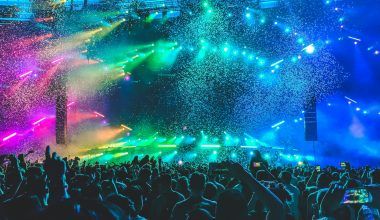If you’re a music lover or someone trying to dive into the music industry, you’ve probably heard the term “EP” thrown around. But what exactly does it mean? EP stands for “Extended Play.” It’s a collection of songs that’s longer than a single but shorter than a full-length album. An EP typically includes about 3 to 5 songs and usually has a total playtime of 15 to 30 minutes. Unlike a single, which features just one track, an EP gives artists more room to showcase their range and creativity.
The term “EP” has been around for decades, and its role in the music industry has evolved over time. Today, it serves as a versatile format that artists use to introduce themselves, experiment with new sounds, or even keep their fans engaged between album releases. Understanding what an EP is and how it’s used can help you appreciate the work behind your favorite music even more.
Why Do Artists Release EPs?
Artists release EPs for several reasons, and each reason reflects a specific stage or strategy in their career. For new artists, an EP is often a stepping stone. It’s a way to dip their toes into the music world without the pressure of creating a full album. EPs allow them to showcase their potential while testing the waters to see how listeners respond.
For established artists, EPs serve as a playground for creativity. They can experiment with new styles or themes that might not fit into a traditional album. EPs also work as a way to keep the momentum going between major releases. Fans appreciate the steady stream of music, and artists get the chance to stay relevant in a competitive industry.
Some EPs even act as teasers. Artists might use them to build anticipation for an upcoming album. By releasing a few songs ahead of time, they give fans a taste of what’s to come, creating buzz and excitement.
The History of EPs in Music
The concept of the EP isn’t new. It dates back to the early days of vinyl records. In the mid-20th century, EPs were released on 7-inch discs that could hold more songs than a single but fewer than a full album. These records were popular because they were more affordable than albums and offered more content than singles.
As technology evolved, so did the EP. With the rise of CDs and, later, digital streaming platforms, the format became even more accessible. Today, EPs are not limited by physical constraints, allowing artists to experiment with length and content. Despite the changes in how music is consumed, the EP has remained a staple in the industry, proving its adaptability and importance.
How EPs Differ from Albums and Singles
At first glance, the difference between an EP, an album, and a single might seem straightforward. However, the lines can blur depending on the artist and the context. Let’s break it down:
- Singles: These are standalone tracks, often released to promote an upcoming project or gain attention. A single is usually just one song but may include additional versions, like a remix or instrumental.
- EPs: These are longer than singles but shorter than albums. They offer a small collection of songs that revolve around a theme or idea. EPs are less of a commitment than albums but still give fans a richer experience.
- Albums: Full-length albums are comprehensive works, often containing 10 or more songs. They usually represent a significant creative effort and mark important milestones in an artist’s career.
Knowing these differences can help you understand the purpose behind each release and how they fit into an artist’s journey.
The Creative Freedom of EPs
One of the most exciting things about EPs is the creative freedom they offer. Without the pressure to fill an entire album, artists can take risks. They might explore new genres, collaborate with unexpected partners, or experiment with storytelling techniques.
For listeners, this means EPs can be incredibly diverse and exciting. You might hear an artist try something completely out of their comfort zone, offering a fresh perspective on their music. This freedom makes EPs a treasure trove of hidden gems and surprises.
How to Discover Great EPs
Finding great EPs can be as thrilling as discovering a new favorite artist. Start by exploring your favorite streaming platforms. Many have curated playlists or recommendations that highlight new EP releases. Social media is another fantastic resource. Follow artists, labels, and music influencers to stay updated on the latest drops.
Don’t forget to dive into the back catalog of your favorite musicians. Sometimes, their earlier EPs hold the raw essence of their artistry, offering a glimpse into their creative evolution. Independent artists and smaller labels often release incredible EPs that might not get mainstream attention but are well worth a listen.
EPs in the Digital Age
The rise of streaming platforms has revolutionized how music is released and consumed. EPs have benefited greatly from this shift. Digital platforms eliminate the physical limitations of traditional formats, making it easier than ever for artists to release EPs.
In the past, EPs might have been overshadowed by full albums, but now they hold their own in playlists and recommendations. The shorter length makes them perfect for today’s fast-paced world, where listeners often prefer quick, digestible content.
How to Create Your Own EP
If you’re an aspiring artist, creating an EP is a fantastic way to showcase your talent. Start by deciding on a theme or concept. What story do you want to tell? Once you have a clear vision, select 3 to 5 songs that fit the narrative.
Collaborate with producers, musicians, or anyone else who can help bring your vision to life. Remember, quality matters. Even though an EP is shorter than an album, it’s still a representation of your artistry. Invest time and effort into every detail, from the songwriting to the mixing and mastering.
Once your EP is ready, think about how you want to release it. Will it be available on streaming platforms? Do you want to create physical copies? Consider your audience and how they’re most likely to discover your music.
The Future of EPs
EPs have come a long way, and their future looks bright. As the music industry continues to evolve, EPs are likely to become even more prominent. They offer a flexible and creative format that adapts well to changing listener habits and technological advancements.
For fans, this means more opportunities to connect with their favorite artists and discover new ones. For artists, EPs represent a unique way to express themselves and reach audiences worldwide.
Why You Should Explore EPs
If you’ve never paid much attention to EPs, now is the perfect time to start. They’re a gateway to discovering new music and understanding the creative process behind it. Whether you’re a casual listener or a die-hard fan, EPs have something to offer.
So, next time you’re scrolling through your favorite music app, take a moment to check out an EP. You might just find your next favorite song or artist.
For further reading, explore these related articles:
- Everything You Need to Know About Country Songs: The Heart of Music
- How TikTok Made These Songs Famous: The Stories Behind Viral Hits
For additional resources on music marketing and distribution, visit DMT Records Pvt. Ltd..






